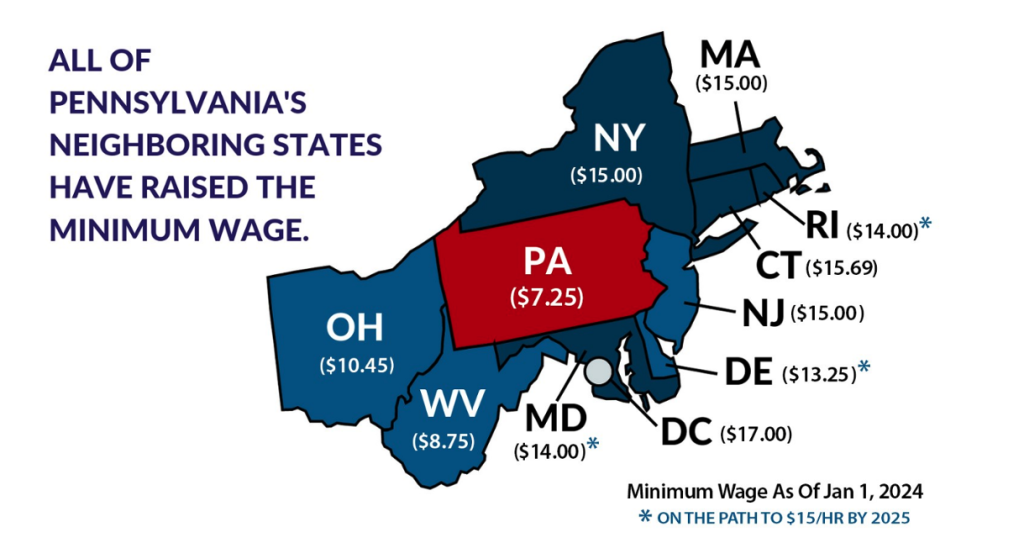As we close out 2023 and usher in the new year, Pennsylvania stands out in the Northeast and Mid-Atlantic region for what we haven’t done—we haven’t raised our minimum wage above the federal minimum wage of 7.25 per hour.
Five of our neighboring states (Ohio, New York, New Jersey, Maryland, and Delaware) are among 22 states (and 43 localities) across the country that will ring in the new year by raising their minimum wage on January 1, 2024. New York and New Jersey will reach a statewide minimum wage of $15 on New Year’s Day 2024, with Maryland and Delaware reaching $15 per hour by January 2025. Because of similar minimum wage increases, millions of workers in our region—including states to the east of NY and NY (CT, MA, and Rhode Island) and the District of Columbia on Maryland’s southern border—and across the country will enjoy a much-needed new year’s pay raise. But Pennsylvania’s minimum wage remains at $7.25 per hour, stagnant since 2009.

The buying power of the minimum wage has plummeted by 30% in the almost 15 years since it was last increased (on July 24, 2009) in Pennsylvania (and nationally). Thirty states since then have raised their state minimums over the national minimum wage of $7.25 per hour. Thirty states. This isn’t a pioneering policy, we aren’t blazing any trails. We’re eating the dust of 30 states that have already figured this out and raised their minimum wage. Twenty-six states currently have scheduled minimum wage increases, and 19 states and DC have tied their minimum wage to inflation so that workers will see their pay rise each year as the cost-of-living changes in the future.
In June 2023, Pennsylvania lawmakers in the State House passed legislation (H.B. 1500) to increase the minimum wage to $15 per hour by 2026 starting with an increase to $11 by January 2024, practically a copy of the minimum wage bill sponsored by Republican Senator Daniel Laughlin from Erie and introduced in the State Senate earlier in the year (S.B. 743). Currently, the Pennsylvania Senate is out of session and isn’t scheduled to reconvene until Tuesday, January 2, 2024, too late to pass this much-needed legislation as-is.
While only about 60,000 Pennsylvania workers earn an hourly wage that is at or below the minimum wage of $7.25, 1.3 million additional Pennsylvania workers would see their wages rise with a $15 per hour minimum wage by January 2026.
Workers in surrounding states earn more money than Pennsylvania workers in the same types of jobs—several thousand dollars more per year for full-time, year-round low-wage workers—putting Pennsylvania employers at a disadvantage when competing for workers in a host of industry labor markets. In leisure and hospitality, and other low-wage industries, many Pennsylvania workers now go to New York—or New Jersey, Delaware, or Maryland—to get a living-wage job. Very few workers from those neighboring states cross the border into Pennsylvania to take a poverty-wage job.
Raising the minimum wage is good policy and good politics. It is a policy that helps struggling families pay for groceries, rent, utilities, and other necessities. It is a policy that shows that we value hard work and our most vulnerable workers. It is a policy that says no one should work full time and not be able to afford basic necessities, no matter where they live or what job they do.
As we wrap up 2023, Pennsylvanians look on as over half the country—including every state bordering the Commonwealth—enjoy the benefits of a minimum wage policy that better rewards work and values workers. Will 2024 be the year we in Pennsylvania finally pass a smart minimum wage policy?
This article first appeared in the Pennsylvania Capital-Star (12/31/23).